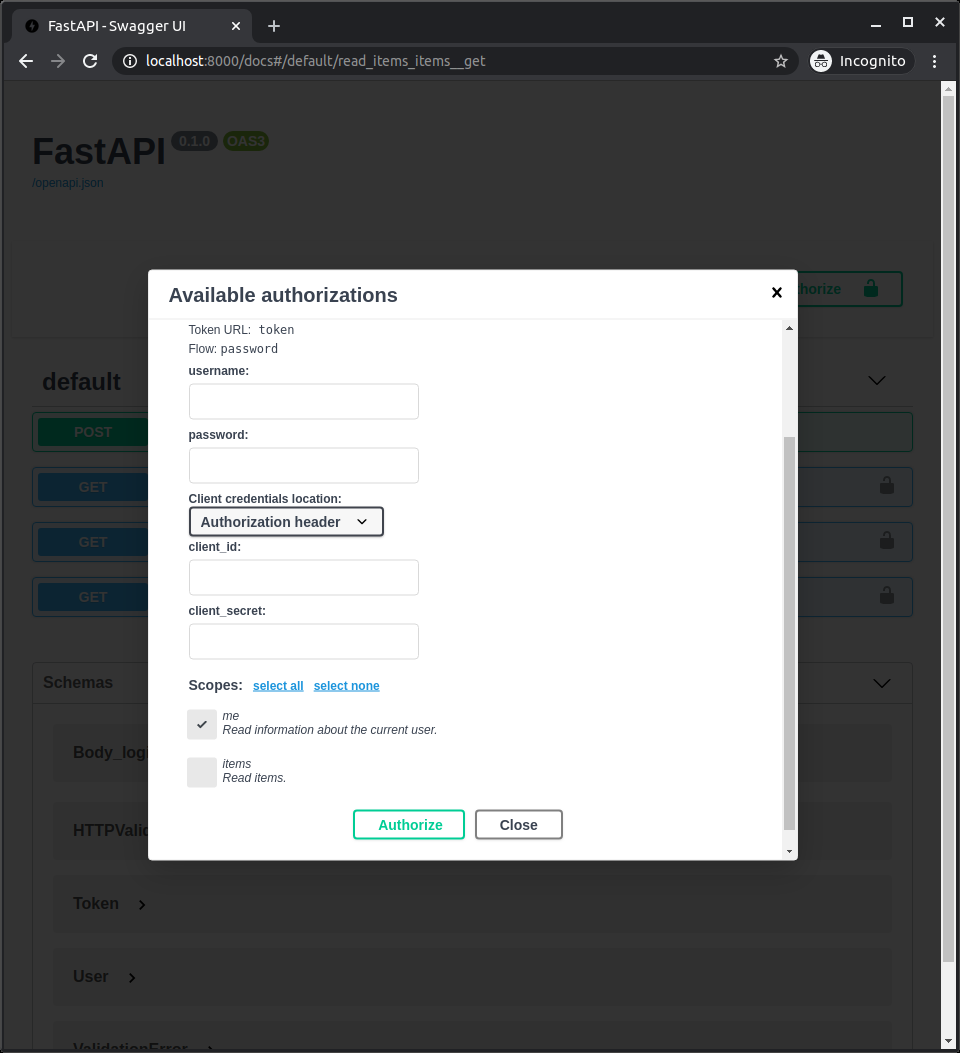FASTAPI OAuth2 Scopes
TOPIC
https://fastapi.tiangolo.com/advanced/security/oauth2-scopes/
FASAPI不支持OAuth2的全部流程,但是支持scopes功能,
类似一起全集API,特定的用户只能访问其scope范围之内的API,
使用此功能, 即不再是登录只有所有API都能访问。
You can use OAuth2 scopes directly with FastAPI, they are integrated to work seamlessly.
This would allow you to have a more fine-grained permission system, following the OAuth2 standard, integrated into your OpenAPI application (and the API docs).
OAuth2 with scopes is the mechanism used by many big authentication providers, like Facebook, Google, GitHub, Microsoft, Twitter, etc. They use it to provide specific permissions to users and applications.
Every time you "log in with" Facebook, Google, GitHub, Microsoft, Twitter, that application is using OAuth2 with scopes.
In this section you will see how to manage authentication and authorization with the same OAuth2 with scopes in your FastAPI application.
DEMO
对于用户登录,在可选的scope中,用户选中的scope修饰的API, 用户才有访问权限。
from datetime import datetime, timedelta from typing import List, Union from fastapi import Depends, FastAPI, HTTPException, Security, status from fastapi.security import ( OAuth2PasswordBearer, OAuth2PasswordRequestForm, SecurityScopes, ) from jose import JWTError, jwt from passlib.context import CryptContext from pydantic import BaseModel, ValidationError # to get a string like this run: # openssl rand -hex 32 SECRET_KEY = "09d25e094faa6ca2556c818166b7a9563b93f7099f6f0f4caa6cf63b88e8d3e7" ALGORITHM = "HS256" ACCESS_TOKEN_EXPIRE_MINUTES = 30 fake_users_db = { "johndoe": { "username": "johndoe", "full_name": "John Doe", "email": "johndoe@example.com", "hashed_password": "$2b$12$EixZaYVK1fsbw1ZfbX3OXePaWxn96p36WQoeG6Lruj3vjPGga31lW", "disabled": False, }, "alice": { "username": "alice", "full_name": "Alice Chains", "email": "alicechains@example.com", "hashed_password": "$2b$12$gSvqqUPvlXP2tfVFaWK1Be7DlH.PKZbv5H8KnzzVgXXbVxpva.pFm", "disabled": True, }, } class Token(BaseModel): access_token: str token_type: str class TokenData(BaseModel): username: Union[str, None] = None scopes: List[str] = [] class User(BaseModel): username: str email: Union[str, None] = None full_name: Union[str, None] = None disabled: Union[bool, None] = None class UserInDB(User): hashed_password: str pwd_context = CryptContext(schemes=["bcrypt"], deprecated="auto") oauth2_scheme = OAuth2PasswordBearer( tokenUrl="token", scopes={"me": "Read information about the current user.", "items": "Read items."}, ) app = FastAPI() def verify_password(plain_password, hashed_password): return pwd_context.verify(plain_password, hashed_password) def get_password_hash(password): return pwd_context.hash(password) def get_user(db, username: str): if username in db: user_dict = db[username] return UserInDB(**user_dict) def authenticate_user(fake_db, username: str, password: str): user = get_user(fake_db, username) if not user: return False if not verify_password(password, user.hashed_password): return False return user def create_access_token(data: dict, expires_delta: Union[timedelta, None] = None): to_encode = data.copy() if expires_delta: expire = datetime.utcnow() + expires_delta else: expire = datetime.utcnow() + timedelta(minutes=15) to_encode.update({"exp": expire}) encoded_jwt = jwt.encode(to_encode, SECRET_KEY, algorithm=ALGORITHM) return encoded_jwt async def get_current_user( security_scopes: SecurityScopes, token: str = Depends(oauth2_scheme) ): if security_scopes.scopes: authenticate_value = f'Bearer scope="{security_scopes.scope_str}"' else: authenticate_value = f"Bearer" credentials_exception = HTTPException( status_code=status.HTTP_401_UNAUTHORIZED, detail="Could not validate credentials", headers={"WWW-Authenticate": authenticate_value}, ) try: payload = jwt.decode(token, SECRET_KEY, algorithms=[ALGORITHM]) username: str = payload.get("sub") if username is None: raise credentials_exception token_scopes = payload.get("scopes", []) token_data = TokenData(scopes=token_scopes, username=username) except (JWTError, ValidationError): raise credentials_exception user = get_user(fake_users_db, username=token_data.username) if user is None: raise credentials_exception for scope in security_scopes.scopes: if scope not in token_data.scopes: raise HTTPException( status_code=status.HTTP_401_UNAUTHORIZED, detail="Not enough permissions", headers={"WWW-Authenticate": authenticate_value}, ) return user async def get_current_active_user( current_user: User = Security(get_current_user, scopes=["me"]) ): if current_user.disabled: raise HTTPException(status_code=400, detail="Inactive user") return current_user @app.post("/token", response_model=Token) async def login_for_access_token(form_data: OAuth2PasswordRequestForm = Depends()): user = authenticate_user(fake_users_db, form_data.username, form_data.password) if not user: raise HTTPException(status_code=400, detail="Incorrect username or password") access_token_expires = timedelta(minutes=ACCESS_TOKEN_EXPIRE_MINUTES) access_token = create_access_token( data={"sub": user.username, "scopes": form_data.scopes}, expires_delta=access_token_expires, ) return {"access_token": access_token, "token_type": "bearer"} @app.get("/users/me/", response_model=User) async def read_users_me(current_user: User = Depends(get_current_active_user)): return current_user @app.get("/users/me/items/") async def read_own_items( current_user: User = Security(get_current_active_user, scopes=["items"]) ): return [{"item_id": "Foo", "owner": current_user.username}] @app.get("/status/") async def read_system_status(current_user: User = Depends(get_current_user)): return {"status": "ok"}
相关文章
- 微服务下前后端分离的统一认证授权服务,基于Spring Security OAuth2 + Spring Cloud Gateway实现单点登录
- web渗透测试----24、OAuth2身份验证漏洞--(1)OAuth介绍
- Spring Security 实战干货:OAuth2授权回调的处理机制
- CAS的单点登录和oauth2的最大区别
- SpringBoot Spring Security OAuth2 密码模式
- SpringBoot Spring Security OAuth2 授权码模式
- oauth2认证
- spring-security-oauth2注解详解
- Spring Security 与 OAuth2(资源服务器)
- Spring Cloud OAuth2实现手机验证码登录


